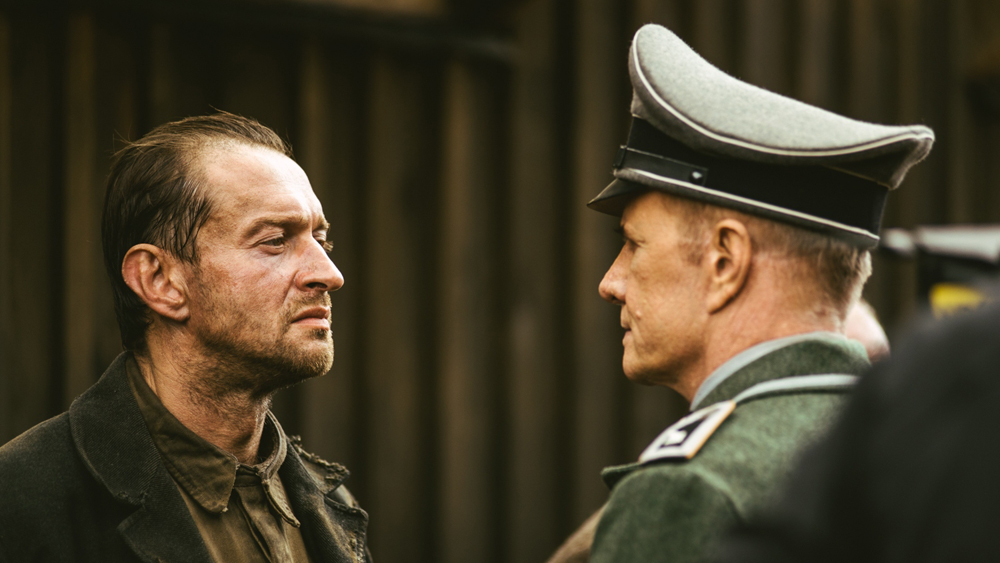SOBIBÓR
Samuel Goldwyn Films
Reviewed for Shockya.com & BigAppleReviews.net by: Harvey Karten
Director: Konstantin Khabenskiy
Screenwriter: Anna Chernakova, Michael Edelstein, Ilya Vasiliev, based on the book by Ilya Vasiliev: “Alexander Pechersky: Breakthrough to Immortality”
Cast: Konstantin Khabenskiy, Christopher Lambert, Mariya Kozhevnikova, Michalina Olszanska, Philippe Reinhardt
Screened at: Critics’ link, NYC, 3/7/19
Opens: March 29, 2019
If you travel to Poland, you will do well to take the day trip from Krakow to Auschwitz, certainly not because there is entertainment to be found there but because the most notorious death camp and its promotion by Germany is part of what is now called grief tourism. The German government has been surprisingly transparent in its vast campaign of owning up what the Nazi government did to the Jews they arrested, most of whom either died in the camps or were summarily shot on location. If the camp at Sobibór is not among the most visited camps today ,it is because unlike with Auschwitz, the Nazis government tore down the camp in 1943 after a dramatic escape by prisoners, making it part of the adjoining forest.
Konstantin Khabenskiy, who directs and stars in “Sobibór” takes on the role of the actual hero, Alexander Pechersky, who led one of the only two successful escapes from concentration camps, standing in as one answer to naïve accusations such as “Why didn’t the Jews do more to fight against the enemy?” Obviously given the way that the guards at the camps crushed not only the spirit of the inmates but did their best to work them to death, Jews were generally in no condition to put up a fight. Given this situation, you can’t blame Russia for commemorating the heroic uprising led by Pechersky, though under an anti-Semitic Stalin, information was kept quiet only because the rebellion was led by Jews. Happily things are different now as we witness the box office success of Khabenskiy’s film, which has among the most gory, bloody scenes of chaos month after month involving German officers living on Cognac and laughing at the humiliations they visit upon the poor prisoners.
Ramunus Greicius films entirely in Vilnius County, Lithuania, standing in for the Polish city of Sobibór which lies southeast of both Warsaw and Treblinka, hugging the border with Ukraine. With a cast including scores of Lithuanian extras, Anna Chernakova, Michael Edelstein and Ilya’s Vasiliev screenplay based on the book “Alexander Pechersky” by Ilya Vasiliev takes us first to the railway where Jews being resettled have allegedly been treated fairly well on the transport to cover up the goal of the Germans. As they depart, they are told “Welcome to your new life,” but instead, most of the women are forced to strip naked and march into the “showers” only to be gassed with carbon monoxide. The men and women who are kept alive are made busy with sewing and chopping, their hard work met with strange rewards including one attempted rape, nonstop floggings, setting Jews up as horses to run the officers around.
As a result of one attempted escape early on, the officers order one inmate of every group of ten to be shot, to discourage further escapes and to demand that the Jews tell the Nazis of any future plan. Among the prisoners is one kapo who is crueler to his fellow Jews than any German, calling them “kikes,” and bringing clear definition to the term “self-hating Jew.” The camp commandant, Karl Frenzel (Christiopher Lambert) does little to discipline the men, even encouraging them to shoot Jews for sport and, in one instance, to allow Berg (Mindaugas Papinigis) to pour alcohol on one prisoner and set him on fire.
Most of the story deals with life in the camps, which the officers find to their liking being the sadists that they are, nobody forcing restraint while the Jews are beaten so regularly that we wonder how they are able to kill eleven officers, duping them by saying that they have beautiful Parisian leather jackets to show them in their quarters and then stabbing or shooting them. It is only during the final twenty minutes that the actual escape takes place, as prisoners take the pistols and rifles that they capture and make their way into the forest. Slow-motion photography adds drama to the narrative. Regrettably, of the six hundred taking part in the mad dash to freedom, most perished, either killed by guards or exploded in the mine fields surrounding the camp. Only 58 are known to have survived, while some are killed by locals and some by Ukrainian guards.
Because the film so boldly displays the misery dished out to the Jews, who never know whether they would survive the day, it stands as a great tribute to Alexander Pechersky without whose leadership all might have been either killed or too petrified even to attempt escape. English subtitles provided for languages spoken: Russian, Polish, German, Dutch, Yiddish
117 minutes. © 2019 by Harvey Karten, Member, New York Film Critics Online
Story – B+
Acting – B+
Technical – A-
Overall – B+







